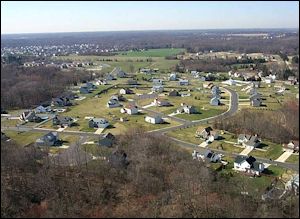I spend a lot of time agonizing over questions that nobody else does. That’s largely because I’m one of the world’s few conservatives who supports the broader vision of the Smart Growth movement.* I have articulated a vision of Smart Growth that is based upon the principles of fiscal conservatism, limited government and free markets. But not many people are buying it.
The reason, I think, can be traced to the political economy of sprawl. Republicans, the party that nominally stands for fiscal conservatism and free markets but rarely governs that way, comprise the party of sprawl. (By “sprawl” I mean the scattered, low-density, autocentric pattern of development that prevailed during the post-World War II era.) Republican voters tend to live in communities born of sprawl, benefit from the subsidies and cross-subsidies that perpetuate sprawl, don’t want to change the way they live and don’t want to give up the subsidies.
Urban geographer Richard Florida drove home that political reality in a recent post on the Atlantic Cities blog. He started with the new data set created by Smart Growth America (See “Measuring Sprawl“) that measured major metropolitan regions on the basis of density, definable activity clusters, mixed uses, walkability and jobs/housing balance. His people then correlated the sprawl index with voting patterns. He wrote:
The connection between sprawl and conservatism comes through loud and clear in our analysis of more than 200 of America’s metro areas. Our correlations suggest that sprawled America is Red America, while Blue America takes on a much more compact geography. The Sprawl Index was negatively associated with the share of voters in a metro who voted for Mitt Romney in 2012 (with a correlation of -.44); and it was positively associated with the percentage who voted for Barack Obama (.43). These were among the strongest correlations in our analysis.
Other researchers have identified a tipping point — roughly 800 inhabitants per square mile — at which voting patterns tend to shift from red to blue.
While Republicans and conservatives have an eagle eye for certain types of subsidies — industrial policy for green tech (Solyndra), say, or a tax code riddled with special perks for special interests, or the massive welfare state that subsidizes poverty-perpetuating behavior — they turn a blind eye to the subsidies that benefit their own constituents. Thus Republicans support the mortgage-interest deduction that favors suburban home ownership. Republicans look askance at subsidies for mass transit (which their constituents are less likely to use) yet they are perfectly willing to subsidize new highways (which their constituents are more likely to use). They decry liberal social engineering when it comes to urban policy but happily support exclusionary zoning that keeps the poor “over there” — even if such zoning violates the property rights of developers who would freely and willingly build low-income housing.
The bottom line is that Republican and conservative politicians apply their free-market, fiscal-conservative principles selectively — when it gores their political foes — and ignore their principles when necessary to protect the interests of their constituents.
Don’t get me wrong. Anyone who knows me knows that I hold Democrats and liberals in even greater disregard. Their hypocrisy is boundless. White, upper-income Dems paint Republicans as racist even as they live in congressional districts with the greatest income disparity and attend the most segregated schools. (See here and here.) The latest case in point comes from Greater Greater Washington: “A new report says Montgomery County (Md.) schools are becoming segregated by income, race, and ethnicity and that ‘white flight’ is occurring in the lowest-performing schools. But officials deny that it’s even happening.” Montgomery County’s 2012 presidential vote: 71% for Barack Obama.
But the cause of truth, justice and the American way compels me to skewer not only my ideological foes but my erstwhile friends and allies when they veer from the path. And the Republican/conservative support for the sprawl-perpetuating policies veers far from the path.
I guess I’ll be a lonely voice for a long time.
* There are a few other voices. Check out the Smart Growth for Conservatives blog.



